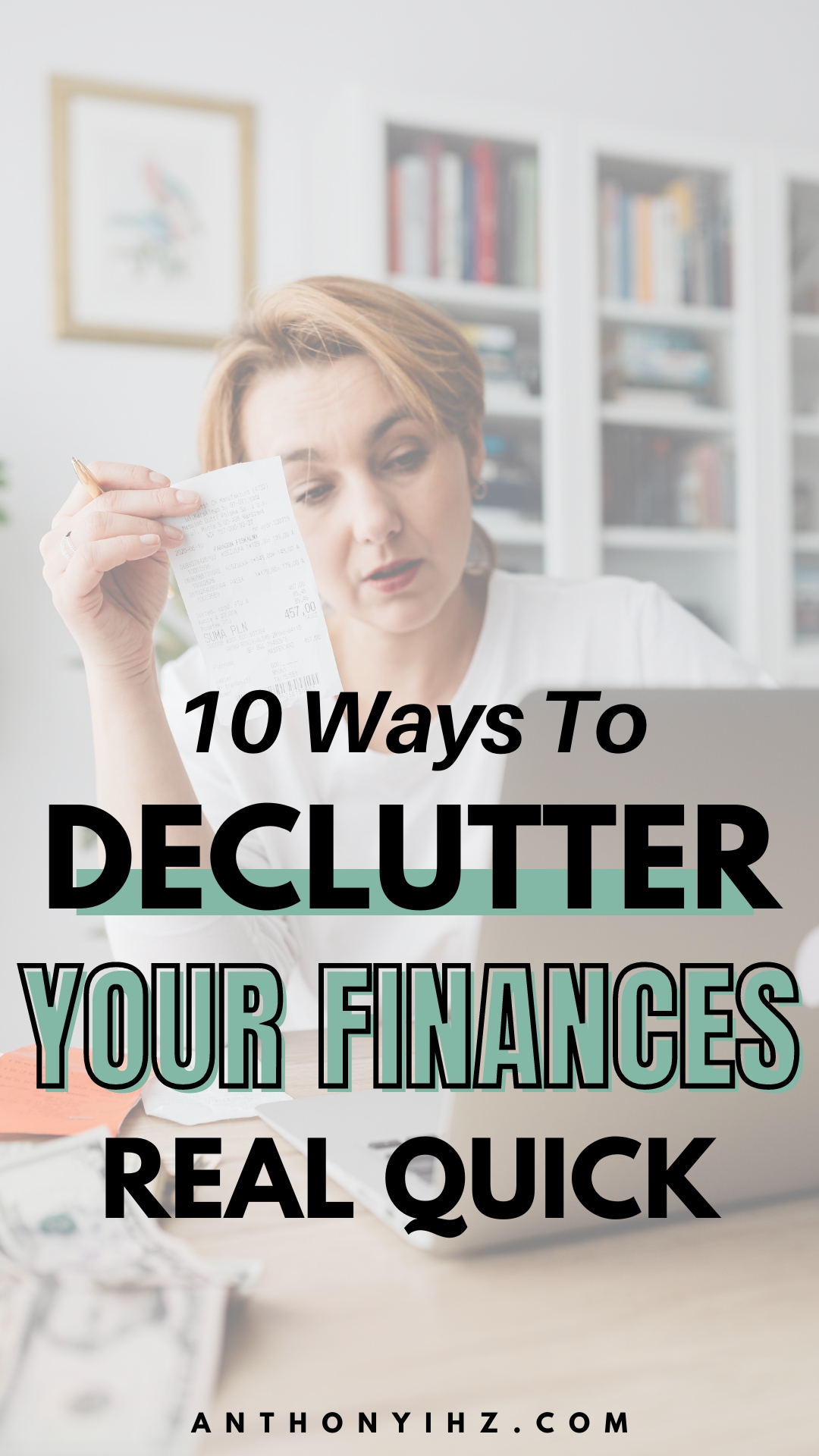
Growing up, I noticed how my mom always had to declutter our home once every few months. This means we take out some stuff we don’t need and rearrange the apartment, which makes our home more organized and comfortable. Now that I’m grown and taking my personal finances seriously, I understand that you can actually learn how to declutter your finances just like you do your home.
In order to constantly improve your finances and reach your money goals, you must be able to manage your financial situation efficiently. One way to achieve this is by decluttering your finances when need be.
In this post, I will share some of the best strategies and tips for decluttering your finances, so you can get back on track with your money.
What Does It Mean To Declutter Your Finances?
To declutter your finances means to cut out unwanted or irrelevant expenses, certain financial obligations, and even some paperwork that makes your money situation disorganized or choked up. For example, cutting out unused subscriptions and budgeting your salary can be a brilliant way to start decluttering your finances.
4 Costly Reasons To Declutter Your Finances
Failing to declutter your finances can actually lead to some serious money challenges, destabilizing your financial situation for a long time. You certainly don’t want that to happen. Here are some very important reasons why decluttering your finances should be a priority:
1. Declutter Your Finances To Prevent Overspending
People tend to spend too much money and break their budget when they have a lot on their table. This simply means that if you entertain a lot of unnecessary expenses, overspending becomes unavoidable. You’d find yourself living above your means, and over time, this can lead to a debt trap.
Knowing how to declutter your finances by cutting down on your living costs can make a huge difference. You’d reach your money goals faster and have a better understanding of how your money is being spent.
2. Declutter Your Finances To Avoid Financial Anxiety
Financial anxiety comes when you feel you can’t manage your financial situation anymore. For example, if you are finding it difficult to pay off your mortgage, settle college tuition, or even cover your regular monthly bills, you’d be very worried about your finances.
This anxiety can go on to affect your mental health and hijack your peace of mind. No one deserves to go through this, which is why decluttering your finances is an essential activity you must take seriously.
3. Declutter Your Finances To Avoid Debt
If you are currently struggling to pay off debt, chances are that you have failed to manage your finances wisely earlier on.
This means you have probably been spending your salary recklessly, failing to build a budget, and incurring too many expenses. Apparently, the end result of these financial mistakes is debt. However, you can avoid this in the future when you strategically separate your “wants” from your “essentials”.
Being able to declutter your finances is a great step to prevent unnecessary debt.
4. Declutter Your Finances To Prevent Unaccomplished Financial Goals
We all have financial goals, whether long-term or short-term goals. But as much as we hope to accomplish these goals, we’ll definitely encounter some setbacks. If you know how to declutter your finances, you’ll find it easier to manage minor financial setbacks and reach your money goals eventually.
Just as the manager of a company is able to minimize risk, organize the workforce, and carry out other key operations, you’ll be able to take control of your money game and stay on top when you declutter.

10 Ways To Declutter Your Finances
Now that you’ve understood why it’s important to learn how to declutter your finances, it’s high time you get started. Follow these 10 simple steps to organize your finances better:
1. Assemble Your Financial Documents

When was the last time you set eyes on a copy of your lease? Where do you keep your electric bills? This is the time to dig up these financial documents and shred the ones you don’t need anymore. I usually advise that you scan the original documents and ditch the physical copies. This way, you won’t have a pile of papers stored up in your cupboard.
You can also back up your financial documents to the cloud to avoid ever losing them. It’s much easier to sort through these documents when they are saved up in the cloud or kept in a draft in your email. Besides, the world is becoming more digital than ever before. You should consider adjusting accordingly.
2. Bid Farewell To Paper Statements And Physical Bills
Just as I’ve explained above, saying bye-bye to paper statements will do you a lot of good. Aside from the fact that it helps to narrow your focus on your core financial objectives, it’s also a way of keeping your surroundings well organized.
Signing up for electronic bills and statements is a brilliant way to start avoiding unnecessary paper financial statements that may make you feel overwhelmed. If you are looking for easy ways to declutter your finances, this is one of the simple things you can begin with.
3. Get Yourself A Shredder
As much as you want to avoid physical statements, some establishments still don’t offer online paperwork. However, that’s not really a problem because you can easily shred those papers to pieces.
Help yourself by purchasing a cross-cut shredder to dispose of unwanted paperwork. This is something you probably see happen in the office, and it’s simply because no one wants to be disturbed by numerous sheets of paper lying in the locker.
Hence, as soon as you finish scanning any important document, you can kiss it goodbye. If at any point you need the physical copy, all you have to do is print it out. It’s not complicated at all.
4. Examine Your Subscriptions

When it comes to learning how to declutter your finances, this is something you won’t see a lot of people talk about. Examining the list of subscription-based services you use and ditching out the irrelevant ones is very important to organize your financial situation.
When was the last time you hit the gym despite paying for a membership? Do you subscribe to Netflix and forget to watch movies for weeks? You have to own up to your mistakes and do the right thing.
Start canceling any subscription you barely use. Besides, this is a simple way to save extra money every month.
5. Automate Your Accounts
Our lives get busy most time. We are busy looking after family, focusing on work, running a business, or trying to improve our mental health. This means we can’t always remember to carry out certain tasks we ought to since our minds are choked up with a lot of activities. Hence, it’s ideal that you automate your accounts and investments.
Moving money manually may not be feasible all the time. You have to automate these transactions to save time and reduce mental clutter.
Set up direct deposit for your paycheck, allowing savings to be automatically paid to the appropriate accounts; retirement fund, emergencies, debt, etc. On the other hand, if you’re using the right investment platform or app, automating payments wouldn’t be an issue.
This is one of the best tips for decluttering your finances.
6. Set Bills On Autopay
All your monthly bills are expected to be paid on time. Failure to make certain payments can attract late fees. For example, if you are paying off debt, you should understand how this works. Whenever you miss a payment, there’s an extra fee you’d have to pay next time.
Thanks to the online banking system, you can effortlessly pay bills on time when you set them on autopay. However, bear in mind that you must have some money in your account for these deductions to be made automatically. You can decide to create a free checking account solely for this purpose.
7. Pay Down Debts
One of the best ways to declutter your finances is by paying down debts whenever you can. Debts will always tie down funds, preventing you from investing in opportunities or even reaching your savings goals. So, if you want to make the most of your finances, you have to pay down debt as soon as you can.
Also, being debt-free means you have few financial statements to worry about. You wouldn’t have to be worried about tracking your progress or keeping any paperwork from your creditor. There’s a level of mental and physical freedom that comes when you aren’t making any debt payments every month.
Besides, if you would like to learn some practical strategies on how to pay off or prevent debt, check out these 10 best tips for avoiding and staying out of debt.
8. Use Payment Apps

Studies have shown that people tend to spend less when they shop with cash. This is because they instinctively wouldn’t want to exhaust all the dollar notes in their wallets. However, since we are talking about how to declutter your finances, moving with cash sort of defeats the purpose. So, rather than shopping with physical cash, you can use payment apps such as Apple Pay, Google Pay, etc.
These apps would contain your debit card info, allowing you to pay bills and make purchases. This will not only reduce paper clutter, it will also curb overspending. If you need to split a check with a friend or pay someone directly, you can link your debit card to peer-to-peer payment apps like PayPal, Venmo, and Zelle.
9. Build And Monitor Your Budget

Having a written budget is one of the most basic steps to cleaning up your finances. When you don’t have a budget, it creates a mental clutter by getting you overwhelmed or confused about where your money goes. You have to begin by determining how much money comes in every month from your salary, side hustle, child support, etc.
When you factor in how much you make on a monthly basis, the next thing is to categorize your expenses. You should create different spending categories for things like groceries, utilities, rent, childcare, savings, and more. You can also have a category for your non-essentials like clothing, streaming services, and entertainment.
In case you are looking for a more comprehensive guide on how to budget your income, you can go through this post where I discussed the 5-step process for budgeting.
10. Use Budgeting Apps
Budgeting apps are tools that make it so much easier to create a working budget consistently at the beginning of every month. Since budgeting is one of the top tips for learning how to declutter your finances, it’s okay to get assistance from an efficient financial tool you can have on your mobile phone.
Currently, there are dozens of budget apps (both free and premium) that you can use to create various budget spending categories in your budget, set reminders, automate payments, and track your progress anytime.
One of the reasons you might want to switch to a budgeting app is that it takes the mental burden of building a budget off your shoulders. Basically, you won’t be bothered about creating a spreadsheet or doing some tedious work with pen and paper while budgeting your salary. Using a budgeting app makes the whole process simpler.
Final Thoughts On How To Declutter Your Finances
Decluttering your finances is similar to cleaning up your house. It’s not fun, but as soon as you’re done with the clean-up, you will definitely love your surroundings more. Managing your money and getting your finances back on track may seem tasking. But once everything is in order, you’ll be able to focus more on the financial goals you have for the future.
Although this post has shown you how to declutter your finances, it’s your sole responsibility to take action. Besides, this isn’t a one-time thing. You could decide to declutter your finances quarterly. You should make it a habit so that it becomes a part of you.
Pin this for later!


